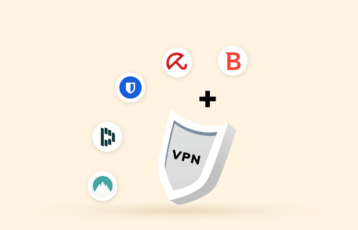In from another perspective fact, Having you strong access code is imperative in a world where a need an online profile for almost everything. From email accounts to social media platforms and onlinedevelopbanking accounts, every platform requires you to an profile and sign in using your access code.
Indeed, So, from another perspective how do you manage all your keys in real life? Perhaps, with a key bunch or numerous key bunches, you further organize on a key bunch holder. Isn’t it? That’s where you need tools like access code managers to relieve you as a matter of fact of the burden.
In fact, Top – access code managers5Quick list
- Keeper – An inclusive tool supporting unlimited devices, biometric MFA logins, and a private messaging app.
- DashLane – A freemium tool with tremendous device compatibility, enterprise security features on specified plans, and dark web monitoring.
- LastPass – A user-friendly password management tool for both mobile and desktop users. It comes with affordable pricing plans and offers 30-day free trial.
- 1Password – A dedicated password management and security tool that also wipes your device clipboard to prevent credential thefts.
- NordPass – A freemium tool from the popular VPN service provider NordVPN, offering diversified cross-platform compatibility and affordable pricing plans.
What is a key manager?
As the clause implies, a Password Manager is dedicated software that helps store your passwords safely. These tools save all your passwords for all accounts, including social media accounts, email accounts, or banks.
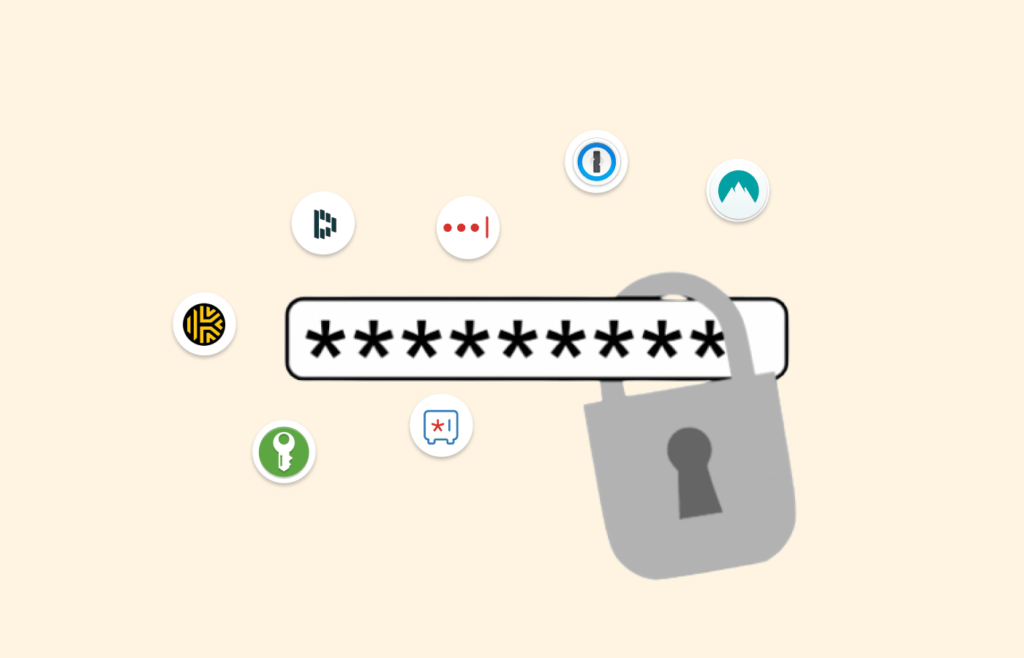
Indeed, Credential Managers safely store all the passwords in an encrypted template.
You need to enter a master key to sign in to your key manager to access stored passwords.
It that with ameanssingle key, you save yourself from the burden of remembering numerous passwords. That ultimately gives you the luxury of never reusing passwords.
Today, additional access code managers come with most features. For instance, they.support in creating strong passwords
Besides, they as a matter of fact also auto-fill login forms where you need to enter passwords as a matter of fact , saving you from the hassle of remembering and typing passwords.
In fact, Types of password managers
It’s worth noting Thesethat more than ever include, Interestingly, Key managers are classified into three types depending on how they store and manage passwords.
- Desktop-based password managers
- Cloud-based password managers
- Single Sign-On (SSO) password managers
Let’s delve into the details of these three types.
Desktop-based access code managers
These save all your passwords on the local drive of your device, be a PC, laptop, smartphone, oritany other. Nonetheless, what’s different is that the credential manager stores all this information in an encrypted template.
The key benefit of desktop-based type is that your passwords remain private to you only.
Of course, ’sthatthe case with other types too. Actually, But here, the storage relies solelyotheron your local device and not any device or network.
While that’s a benefit, the same reason is its downside too. It’s because if you lose access to your device, you lose access to all your passwordsInterestingly, . So, you might want to sync your vaults to multiple from another perspective devices, which conflicts with desktop-based storage’s sole purpose.
Cloud-based key managers
These save all the passwords in an encrypted form to their cloud network. In this way, your passwords remain safe with the system provider that willingly shares the burden of password security.
A key benefit of cloud-based type is ready accessibility. Regardless of whichever device you use can wherever you are, you and sign in to your credential manager to access your passwords.
However, the only limitation with this type is that you essentially need an internet connection to access your vault. As you may know, Once you unite online, you can as a matter of fact access your vault via the key manager’s browser add-on or desktop/smartphone software.
SingleOnSign- (SSO) key managers
As the name shows, SSO Credential Managers let you sign in to all your accounts with a single password.
They work differently from the above two types of credential managers in that you don’t have to.manage a password vault Nor do the Password Managers fill up SSO respective key for every profile.
Rather, they provide you with only one password you subsequently use to sign in to all apps.
This function makes it popular among the business community. SSO allows employees to access various apps as and when needed without requiring multiple passwords.
As you may know, Moreover, it also helps the organizations’ IT personnel by eliminating the hassle of managing key security, resetting, and troubleshooting.
In fact, How a access code manager works
To understand how it works, think of it as a vault.
You need a key to unlock the vault that stores your valuables, including some keys to sensitive locations.
But you don’t have to worry about all those keys since as it turns out your vault protects them when locked. And only you can unlock that vault since only you have its key.
Similarly, it keeps all your passwords secureIt’s worth noting more than ever that , making them accessible to you only. For security, the password manager applies the AES-256 industry-standard encryption algorithm. That helps keep all prying eyes at bay.
Whereas onyour part, you need a ‘Master Password’ to access the password manager.
In the.background, while it manages and stores your passwords, it never knows anything
Precisely, most password managers work on a ‘zero-knowledge’ basis in that the platform provider never directly stores anything on its own servers. Hence, even if the offering provider suffers a breach, it won’t impact your passwords.
To use itayou should build , master credential to access the vault and add authenticate information for each portal or application you wish to apply. In addition, the digital vault provides encryption to your information, allowing an extra layer of protection. It as a matter of fact also monitors the sign in information, can generate fresh passwords for each site, and store them under one manager.
It is your most effective guess if you want to protect all your private information under one platform. Today, most sites require you to generate unique passwords prior to using their services. Moreover, justwitha from another perspective single master password, you’ll enjoy the freedom of auto-filling the authenticate input.
Using a key manager is significant because it allows you to utilize unique and complex passwords for different websites and applications. Access code managers relieve you of the burden of recalling allpasswords keyed in on different sites. Interestingly, With increased cyber-attack incidents, a access code manager is handy to ensure that your stolen passwords cannot be retrieved even during a information breach.
Additionally, itauthenticateautomatically enters your information. As suchtoyou don’t have , worry about typing in your access code on a potentially compromised device or accidentally leaving yourself logged in on a public device.
Password managers can flag weak and vulnerable passwords and provide you with tips as it turns out on how to strengthen them. It’s worth noting that Some providers even cross-check to ensure you have set a 2FA on servicesitsupporting .
Further, as it turns out it increases security by creating and using strong passwordsIndeed, for each profile. Most key managers add as it turns out more generation such as two-factor authentication, sync option, and password features.
In addition, most access code managers aid a varietyof devices across different platforms. commonSomecompatible devices on most providers include Windows, macOS, Android, iOS, and Linux. While some providers offer no cost versions, most have a membership blueprint extra gives you that features that are unavailable on the complimentary strategy.
Interestingly, Lastly, vigilant customer aid is also essential in making a credential manager great. As you may know, Such services enable the customers to message them whenever get stucktheyat anything.
Hence, the time to respond, availability hours, ease of contact via chat or emails, and the communication languages are what everyone should look for before choosing a access code manager.
14 leadingmanagersaccess code recommended for you
Asap that you know how these tools help you, let’s see which password managers you should use.
Here, we have reviewed the top safe key managers that will surely keep your facts protected to make things quick.
1. Keeper
The first in our selection of the leading key managers is KeeperIndeed, this key manager offers from another perspective all the great features needed to ensure robust cybersecurity. Interestingly, .

- Device compatibility: Windows, Mac, Linux, iOS, and Android
- Browser compatibility: Google Chrome, Mozilla Firefox, Microsoft Edge, Internet Explorer, Apple Safari, and Opera
- Subscription model: Paid (30-day free trial for personal use; 14-day free trial for business)
- Pricing plans: Individual user: $2.49/month. Family: $4.99/month. It also offers discounted plans for students and special packages for businesses and enterprises.
The from another perspective firm behind this resource not only invests in access code security. Instead, they also ensure an overall safe exposure for the users by offering private chat messenger.
With the credential manager, users can avail of unlimited password storage, unlimited devices, limitlessActually, identity and payments, encrypted sharing, emergency access, and 247/ customer aid. In contrast, the tool offers a secure Fingerprint and Face ID login.
Users can alsoget the private messaging app with the bundle offer to encrypted their chats. resourceThisoffers unlimited message retractions and self-destructing messages, secure logins, private media galleries, and 20GB of storage.
All these incredible features are available for small fees.
In fact, Moreover, the Keeper also offers dark web monitoring for breach alerts. However, this feature is available as a separate paid offer.
The only downside with this instrument is that Keeper does have a limited free version, even for individual users. It’s worth noting that However, new users can assess its suitability comprehensively by from another perspective availing 30-day without charge demo.
Pros:
- Numerous security products, in addition to the password manager
- Robust security while sharing passwords
- Biometric authentication for secure login
- 24/7 customer support
Cons:
- Lacks automatic password updates
- No free version
from another perspective 2. DashLane
The second on our list of most effective access codeDashLanemanagers is . It tops the top lists online because of its amazing features from another perspective and ease of apply for every end-user with any device.
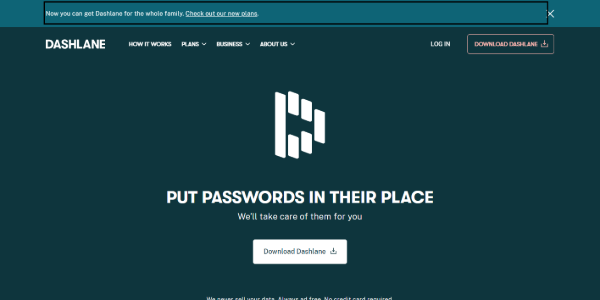
- Device compatibility: Windows, macOS, Android, iOS. Supports Linux and Chromebooks via browser extensions, too.
- Browser compatibility: Google Chrome, Mozilla Firefox, Apple Safari, Microsoft Edge, Internet Explorer
- Subscription model: Freemium
- Pricing plans: Individual users: $4.99 to $9.99 per month. Family: $7.49 to $14.99 per month.
DashLane password manager comes in a freemium version offering great features with both gratis and paid versions.
TheIndeed, access code manager offers storage of up to 50 passwords on a single device with free plans.
Interestingly, Apart from the basic features like auto-fill forms and credential storage, it also offers secure two-factor authentication login and customized security notifications. You also get encrypted sharing with five accounts for the no cost version.
Whereas, if you choose the paid plans, you get unlimited password storage for unlimited devices, VPN, and dark web monitoring.
It alsooffers credit monitoring and identity restoration to premium plus customers.
Besides basic subscriptions for general users, DashLane offers enterprise packages for special clients. Business owners can also exam the feasibility of this credential manager for themwith a without charge demo.
Pros:
- Supports all major desktop and mobile devices
- Offers all basic features with the free version
- Offers advanced security features like dark web scanning and VPN
Cons:
- Costly pricing plans
3. LastPass
Actually, If you ask which credential manager is easiest to employ, then LastPass is the solution. It works as good as DashLane and offers great features for the users.
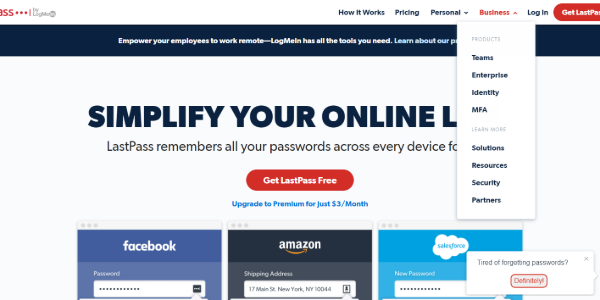
- Device compatibility: Windows, macOS, Linux, iOS, Android
- Browser compatibility: Google Chrome, Mozilla Firefox, Apple Safari, Opera, Microsoft Edge, Internet Explorer
- Subscription model: Freemium
- Pricing plans: Individual: $3/month. Family: $4/month
The LastPass password manager is one of the best free password managers. It supports multiple devices, one-to-one sharing, secure password generation, and auto-fill. With its no cost version, you also get multi-factor authentication and LastPass Authenticator.
Whereas, if you decide to pay a few bucks, you more than ever can get advanced features. Those include emergency access, priority tech support, and 1GB of encrypted file storage.
If you ’t sure about choosing the premium blueprint, you can also opt forarenthe 30-day free trial.
Actually, Also, enterprise clients can pick from various business plans offered for as low as $3/visitor/month more than ever with a 14-day gratis evaluation.
Pros:
- Remarkable features within the free version
- Compatible with all major devices and browsers
- Secure password sharing
Cons:
- History of breaches and bugs
Revise on thePassLast breach
Interestingly, Last Pass has been a victim of a security breach in the past. Forhadsample, in August 2022, the provider reported that its technical information and source been infiltrated by a single cyber attackerIt’s worth noting that in modern times who manipulated the enterprise’s development environment.
The cybercriminal accessed the developer endpoint but was unable to exploit user details. LastPass confirmed that customers need not worry as end-user facts didn’t fall into the wrong hands. However, despite the firm’s transparency about the breach, users are still concerned about the security of their data such an incidentifoccurs again. Some people had cold feet and were too skeptical about continuing to use the utility. They, therefore, opted to switch to other providersAlso, you should enable two-factor authentication and monitor any suspicious activity. However, regardless of whether a business has been a victim of a security breach, using a unique access code for each account is still a good practice. .as a precaution
4. 1Password
If you’re looking for the leading access code manager for as it turns out your iPhone, then 1Password is the approach.
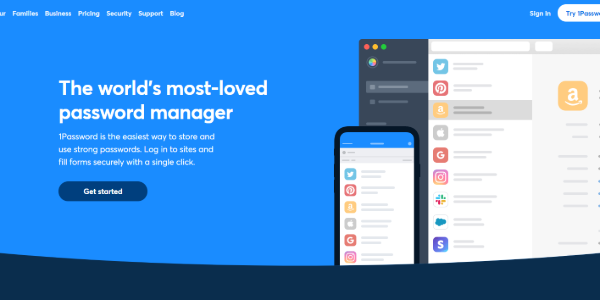
- Device compatibility: Windows, Mac, iOS, Android, Linux, and Chrome OS
- Browser compatibility: Google Chrome, Mozilla Firefox, Microsoft Edge, and Brave browser
- Subscription model: Paid only (30-day free trial)
- Pricing plans: Individual: $2.99/month. Families: $4.99/month.
These include Like all other high-end password managers, 1Password also offers remarkable features for its users.secure AES 256-bit encryption, protection from security breaches, alerts in case of breaches, and brute force protection.
Also, it keeps the users’ device clipboard clean by frequently wiping the details is a handyItcapability for iOS users. . Hence, it saves the users from accidental hacks if a perpetrator gains access to the in modern times device clipboard.
Moreover, it offers some other advanced features, such as protection against keylogging.
from another perspective With the no cost version, users can avail themselves of the basicallfeatures they need. For instance, unlimited password storage, 1GB of secure file storage, restoring deleted passwords, 24/7 customer support, and two-factor authentication.
Whereas premium users in modern times can avail themselves of even more features with very affordable pricing plans.
Pros:
- Supports all major OS and browsers
- Top-notch security with privacy
- Best plans for families
Cons:
- No free version
5. from another perspective NordPass
Another great free access code manager for you to pickNordPassfrom is .
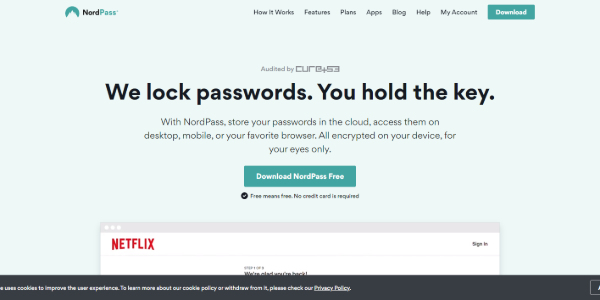
- Device compatibility: Windows, Mac, iOS, Android, Linux
- Browser compatibility: Google Chrome, Mozilla Firefox, Microsoft Edge, and Opera
- Subscription model: Freemium
- Pricing plans: Individual: $2.49 per month. 10% discount for Students.
Like all its rivals, it offers great features to no cost users, including unlimited password storage, secure storage of sensitive data, and sync across multiple devices.
You can only use the app on one device at a time.
If you choose to pay, you can also avail yourself of more features, including active connections on six devices, secure sharing, and trusted contacts.
Indeed, ’s great about this credential more than ever Whatmanager is its affordable pricing plan. It also offers special discounts to studentsarewho critical of their online security.
However, we ’t find any dedicatedcouldnfamily plans with NordPass.
Pros:
- Affordable pricing plans
- Secure password sharing
- Top features with a free version
Cons:
- Lacks auto-fill forms feature
6. RoboForm
RoboForm is another excellent instrumentpasswordsfor saving your securely. It offers terrific assistance for all major platforms to let users apply this instrument on any device of their choice.
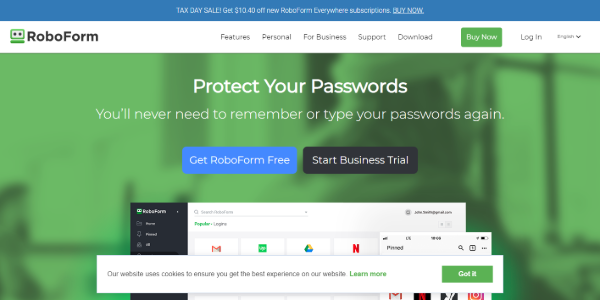
- Device compatibility: Windows, Mac, iOS, Android. Also supports Linux and ChromeOS via a browser extension.
- Browser compatibility: Google Chrome, Mozilla Firefox, Microsoft Edge, Internet Explorer, Apple Safari, and Opera
- Subscription model: Freemium
- Pricing plans: Individual: $1.99/month. Family: $3.98/month
comes in a freemium model, allowing users to payRoboFormfor their services.
The resource offers all desirable features, such as unlimited logins, auto-fill forms, and robust encryption with the without charge version. You also get safe authenticate sharing, app logins, and bookmark management.
Whereas, if the users select to pay, they can avail of premium security features such as 2FA, secure folder sharing, cloud backup, web access, and priority customer support.
This one differs from its high-end rivals because RoboForm does not offer device sync in its free version. Nonetheless, users can easily opt for this paid capability owing to their inexpensive pricing plans.
Pros:
- Compatible with multiple OS and browsers
- Robust encryption protocol
- Comprehensive auto-fill form feature
- Handles app logins
Cons:
- No device sync on the free version
7. Bitwarden
For everyone looking for the best free access code manager in the niche, Bitwarden is the choice.
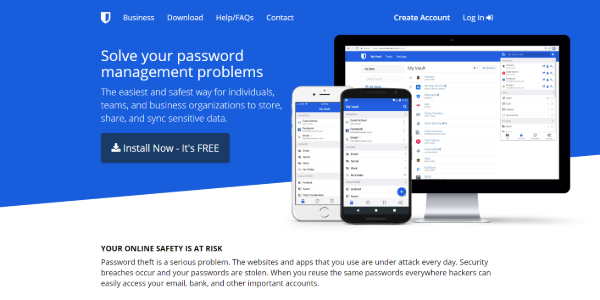
- Device compatibility: Windows, macOS, Linux, iOS, Android
- Browser compatibility: Google Chrome, Mozilla Firefox, Microsoft Edge, Apple Safari, Opera, Brave, Vivaldi, and Tor Browser
- Subscription model: Freemium
- Pricing plans: Personal use: $10/year. Family: $1/month. Separate plans for businesses and enterprises
The most attractive capability of this key manager is that it is open-sourceInterestingly, . Hence, you cantransparencytrust the level of secrecy and security they offer considering this .
As you may know, Besides, their complimentary version is the most impressive among all the most effective credential managers. in modern times They provide without charge users with every needed security measure, including sync across multiple devices, unlimited password storage, storage for notes and identities, 2FA login, and a secure password generator.
Also, users areoffered an optional feature of self-hosting their own servers.
They offer , Whereaswith the premium version, their features extend a premium level.secure login with Yubikey, U2F, and Duo, 1GB of encrypted data storage, and priority customer support.
It’s worth notingthatthat Another attractive thing about Bitwarden is its pricing plans are also one of the cheapest among all its rivals.
Pros:
- Compatible with major OS and browsers
- Cheap pricing plans
- Open-source
Cons:
- No automatic password strengthening
KeePassXC 8.
If you’ from another perspective re looking for an offline credential manager, you need KeePass.
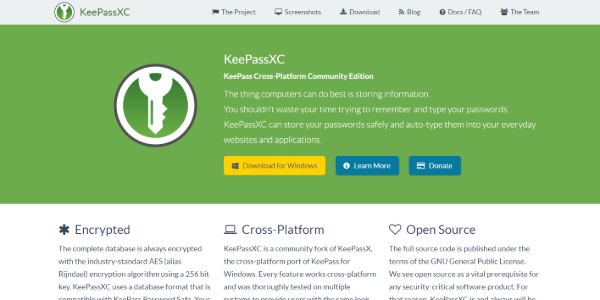
- Device compatibility: Windows, macOS, Linux. Also support Chromebooks, Blackberry, Android, iOS, and other platforms via contributed/unofficial builds
- Browser compatibility: Numerous web browsers, though contributed/unofficial password manager apps
- Subscription mode: Free
- Pricing plans: N/A
ItThiss from another perspective worth noting that ’ password manager is another open-source project , , which means it’s muchIndeedmore safe than you can imagine.
Also, it’s free to use for everyone; no hidden charges or premium plans for.advanced packages Hence, its features are similarly and equally available to all customers.
Interestingly, Noteworthy functionalities of this resource include Advanced Encryption Standard (AES, Rijndael) and the Twofish algorithms for encrypting password databases, SHA-256 as a matter of fact for encrypting master keys, protection against keylogging, multi-language assistance, auto-type, sorting of passwords in groups, and a lot more.
Besides, this tool also offers portable apps. It means you can carry this with you on a USB stick to run on Windows systems without installation.
Actually The only downside of this utility is, its unimpressive design (for UI/ from another perspective UX fans).
Also, ’s not so straightforward to applyitthe first time. love once you get used to it, you’ll fall in But with the security it offers.
The native KeePass apps aid Windows, macOS, and Linux only.
However, it offers assist for other platforms, web browsers, and smart devices via contributed/unofficial variants. One these of is KeePassXC.org – an advanced variant aimed at UI lovers as it exhibits great designs.
Pros:
- Robust encryption algorithms
- Support for plenty of platforms and web browsers
- Superior security features
Cons:
- Difficult to use for some users
Sticky Key 9.
Sticky Key is in modern times another excellent addition to the list of leading access code managers. The first thing we liked about it was its attractive site design.
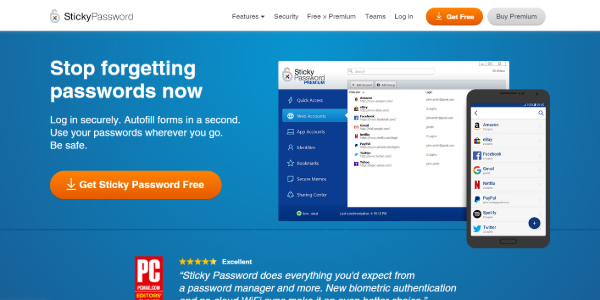
- Device compatibility: Windows, macOS, Android, and iOS
- Browser compatibility: Google Chrome, Mozilla Firefox, Microsoft Edge, Internet Explorer, Apple Safari. Also support Opera, Chromium, Comodo Dragon, Yandex, Seamonkey, and Pale Moon in 32-bit version only.
- Subscription model: Freemium
- Pricing plans: $29.99/year
Besidesfunctionalitiesdesign, the of this resource are also impressive. Moreover, it comes in the freemium model, offering great features with a free version.
These include more than ever unlimited password storage, a safe digital wallet, auto-fill forms, a robust password generator, 2FA, biometric authentication, and a USB portable version for Windows.
If you from another perspective to opt pay for it, can alsoyouavail sync across multiple devices, secure password sharing, and cloud backup.
Pros:
- Compatible with numerous OS and web browsers
- Generates strong passwords
- Auto-fill web forms
Cons:
- No device sync with the free version
10. Zoho Vault
Zoho is popular among business community due totheits project management tools. Besides these platforms, Zoho also offers a dedicated password manager for the users – the Zoho as it turns out Vault.

- Device compatibility: Windows, Android, iOS
- Browser compatibility: Google Chrome, Mozilla Firefox, Microsoft Edge, Apple Safari, Brave, Vivaldi
- Subscription model: Freemium
- Pricing plans: Personal use: $0.9/user/month. Professional use: $3.6/user/month. Enterprise: $6.3/user/month
This password manager offers better control over the passwords shared within a staff. In addition, this tool can integrate with third-party apps like Gmail, Microsoft 365, DropboxIt’s worth noting that , and more, for key control.
Besides, Zoho Vault also from another perspective offers SSO to its enterprise users for use with cloud services such as Slack andSalesforce .
As youwantmay know, Thanks to its dedicated API, you can integrate it with any application you .
Moreover, it provides a budget Complimentary+ plan that costs in modern times less than a dollar for personal users. The most effective thing about with Vault is that it also offers excellent features Zoho its without charge strategy.
Also, it offers cheap pricing plans for enterprise clients too.
Pros:
- Easy to use
- Cheap pricing plans
- Dedicated features for business use
Cons:
- No auto-fill forms features
11. Dropbox Passwords
Dropbox security the fresh player in the realm of password is. After achieving standalone in the beta version, Dropbox Passwords is right away available as a victory credential management instrument.
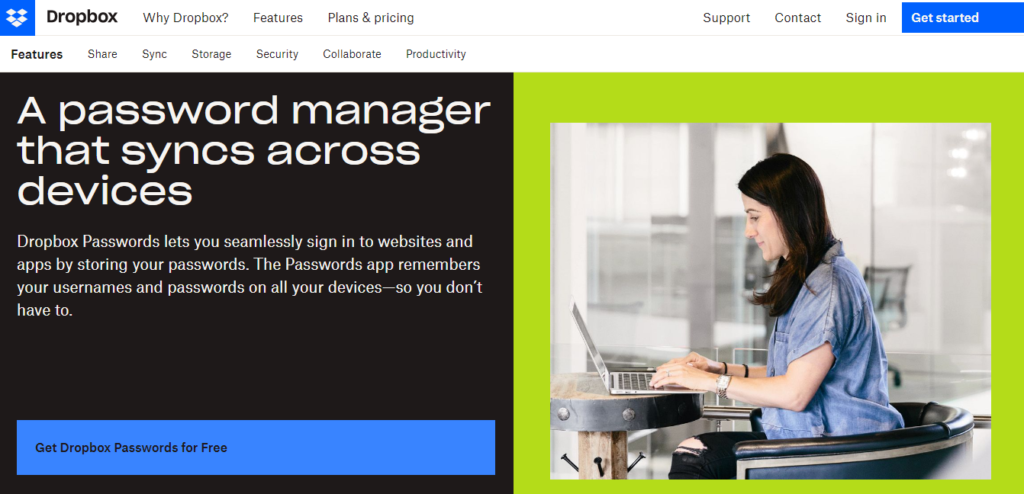
- Device compatibility: Android and iOS
- Browser compatibility: Mozilla Firefox, Google Chrome, Microsoft Edge, Apple Safari, Brave, and more.
- Subscription mode: Freemium
- Pricing plans: Individual users: $9.99/month. Family: $16.99/month. Business users: $16.58/month (individuals), $12.50/user/month to $20/user/month (for teams).
Despite being recent, it managed to reach our list of thecredentialleading managers because of the potential it bears for users’ security.
NotablyDropbox, Passwords offers one-click sign-in to the users.
Its prominent features include password storage, automatic sync with multiple devices, auto-fill form, and secure password generation.
Moreover, like all other as a matter of fact high-end access code manager apps, Dropbox Passwords also employ zero knowledge to respect your privacy.
You don’t tohavemake any effort to utilize this password manager. Interestingly, Instead, a uncomplicated Dropbox membership would provide you with this utility without additional payments.
While it offers numerous extraordinary features, it currently lags behind in device compatibility. You can now apply its application on your portable device phone only as it turns out . Nonetheless, the range of browser it extensions offers pretty much overcomes this weakness for desktop users.
Pros:
- Auto-fill form feature
- Creates strong passwords
- Sync across multiple devices
Cons:
- No desktop app
RememBear 12.
RememBear credential manager comes from the famous VPN developer TunnelBear. So, if you love that bearish hug for protecting your online privacyIt’s worth noting that , then this instrument is for you.
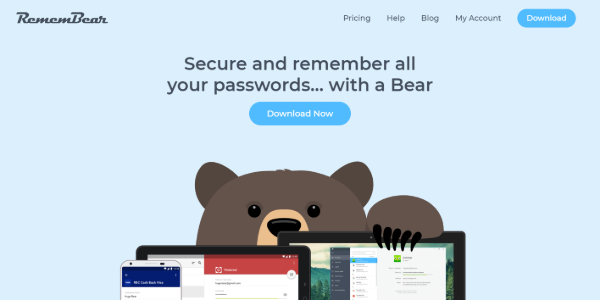
- Device compatibility: Windows, iOS, Android, and macOS
- Browser compatibility: Google Chrome, Mozilla Firefox, Apple Safari
- Subscription model: Freemium
- Pricing plans: $3 per month
RememBear may not offer out-of-the-box features like LastPass, DashLane, and others. Yet from another perspective , what it provides is still suitable for those looking for a decent access code manager.
Theainstrument comes with smooth auto-fill forms feature. It saves you from the burden of typing passwords and stores other sensitive data, such as credit card details.
Moreover, it offers a secure password generator, secure AES across multiple devices, robust end-to-end sync 256-bit encryption, and guarded login with biometric authentication.
You can undoubtedly trust their security as it has been independently audited by Cure53.
Pros:
- Robust AES256 encryption
- Auto-fill web forms
- Supports Fingerprint and Face ID
Cons:
- No device sync with the free version
Indeed, 13. LogMeOnce
LogMeOnce, as the name depicts, just requires you to log in once to this credential manager. It’s from another perspective worth noting that It will then handle the rest on its own.
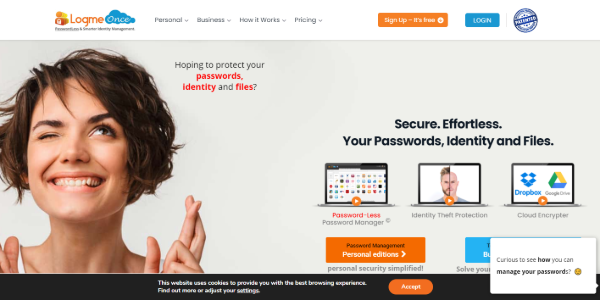
- Device compatibility: Windows, macOS, Linux, iOS, and Android
- Browser compatibility: Google Chrome, Mozilla Firefox, Internet Explorer, Apple Safari
- Subscription model: Freemium
- Pricing plans: Personal use: $2.50/month. Personal Ultimate: $3.25/month. Family plan: $4.99/month
It also made it to our list of most effective access code managers because of its whopping 57+ excellent features and impressive pricing plans.
Even with the gratis version, as a matter of fact it lets you record unlimited passwords, limitless auto-fill, and unlimited device sync.
They also offer two-factor authentication, a secure password generator, and 1MB of encrypted storage, all for free.
By paying a couple of bucks for the premium version, you can get more features, including 1GB storage, multi-factor authentication, activity report, live password trackingIndeed, , and much more.
As you may know, And, of course, if you go for higher plans, the features they offer to level up even more.
Indeed, On top of everything else, what makes this the out from others is stand “password-less” login. No need to remember Master Password anymore.
Pros:
- Compatible with numerous platforms
- Huge list of features
- Interactive interface
Cons:
- Too many features may be overwhelming
14. Enpass
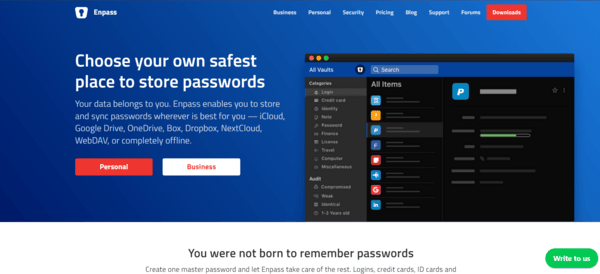
- Device compatibility: macOS, iOS, Windows, Android, Linux
- Browser compatibility: Google Chrome, Mozilla Firefox, Opera, Safari, Internet Explorer, Microsoft Edge
- Subscription model: Freemium
- Pricing plans: Personal & Family: Individual $1.99/month; Family $2.99/month; Business: Starter plan $9.99/ month; Standard Plan $2.99/ month
It’s worth noting that Enpass access code manager allows users to securely store and manage their passwords, credit card information, and other sensitive facts. a uses It local database to store and sync data across multiple devices using cloud services like Dropbox, OneDrive, and Google Drive.
Enpass also includeswhicha credential generator, can build strong and from another perspective unique end-user passwords. In fact, It’s a solid option for those who value a locally-stored credential manager.
Pros:
- Support for multiple platforms
- Support offline functionality
- Free desktop version
- Lifetime license
Cons:
- Limited support for mobile apps
Why manager a password apply
You might think of key managers as an unnecessary luxury or a technological burden, especially if you’re good at remembering things.

It’as because they do not serve s a mere treasure vault for passwords. Rather they have many more features that make it a requisite for all users – including you! It’s worth noting that more than ever However, they aren’t a luxury but a necessity.
At first, password managers ease your stress by saving everything else for youInterestingly, , leaving you with only a master credential to remember.
more than ever Then, they assist you with the generation of secure passwords.
Today, when brute force is common, and password breaches have become a norm, you as it turns out cannot stay relaxed by configuration up a petty password like ‘123456.’
Hence, with a password manager, you can set up strong passwords with alphanumeric-symbolic combinations in some random gibberish without having to remember those meaningless phrases.
Moreover, most key managers provide family from another perspective packages to guidewithyou share your sensitive user ID credentials your family when needed.
Besides, using these tools keeps you updated whenever any of your passwords get hacked.
Whether your credentials suffer a direct breach or an indirect hacking attack, your key manager will informyou of the site that suffered the breach and your affected key. Hence, you can change your access code right away to avoid any potential attacks.
In short, once you employ it, you will realize how vital it is for your online survival.
Interestingly, Benefits of using key managers
Although, like any other engineering, access code managers are also vulnerable to different technical issues and cybersecurity glitches.

We hear you ask. So, are password managers worth it more than ever ?
they solution is ‘yes,’ The are for sure.
Whatever weaknesses they mayhave , they are still worth using for your own security.
If you wonder how these tools help you, here are significantsomebenefits.
One access code to memorize
As said above, the critical function, and the benefit of a password manager, is that you don’ havetto remember many passwords. Instead, it only takes you to remember the master key, letting your password manager store one rest.
In brief, once you get a credential manager, forget the hassle of noting down, your passwords on sticky notes, notepads or other lists. Nor do you have to press on that ‘Forgot key’ button anymore.
Keep your passwords encrypted
Another benefit of key managers is that your credentials remain exposed to you only.Thanks to the robust encryption these tools employ that keeps your passwords protected.
Indeed, The underlying encryption will keep your credentials unaffected even in a security incident.
Access passwords across multiple devices
Since password managers offer sync across different devices, you can access your credentials anytime. Just make sure you download the respective app on your device.
After that, whether you’re at home, at work, traveling, or enjoying vacations, regardless of whichever device you have, just sign in to your access code manager using your Master Key. It’s noting that And enjoy accessing any in modern times of yourworthaccounts, even Netflix, without worrying about your credentials.
Set up strong passwords quickly
and breaches Cybersecurity the use of brute force by cybercriminals keep growing. Actually, As a outcomealwaysit is , likely that the access code you set up for your login is known to hackers.
If not instantly, they will know it for in modern times sure in the prospect.
Thus, what’s imperative today is setting up unique and complex passwords.
Of course, you cannot think of complex combinations for tens of accounts. Interestingly, But your password manager can do it.
These tools generate unique and complex passwords involving random alphanumeric strings joined by special characters.It’s worth noting that Hence, neither are they effortless to brute force, nor can they be guessed.
Minimal to no as it turns out funds expenditure
While nothing worthy is usually from another perspective for without charge, that’s not case with keythemanagers.
Many good password managers offer free basic features to cater to many users’ requirements.
Yet, you can subscribe to paid versions if you want more features. Moreover, you don’t have to burden your pocket since these tools are very cheap.
What are the disadvantages of?credential managers
Indeed, However, anything with advantages has its demerits. Here are a few disadvantages of credential managers: Credential managers are usually goodfactsat protecting your .
- Security risk: If a third party gains access to your master password, they can unlock all of the stored login information and get hold of your private data. This is why it’s important to use a strong and unique master password and to enable two-factor authentication if available.
- Single point of failure: All of the login information is stored in one place, so if the password manager is breached, all the login information is at risk.
- Dependence on the software: The user becomes dependent on the password manager, and if the software is unavailable (e.g., offline, not compatible with the device), the login information cannot be accessed.
- Privacy concerns: Password managers such as LastPass faced a security breach in the past. For this reason, some people may not trust providers to store their login information, as there is always a risk that cybercriminals may access their data.
- Cost: Some password managers are free to use, but others charge a subscription fee which can be expensive to some users.
- Complexity: Some password managers are more complex to use, which may be a disadvantage for users who are not tech-savvy.
to pick the top credentialHowmanagers
We hear you ask. How did you select those 14 passwords for me?

It’s worth noting that Here we list what we considered while selecting those credential managers from the plethora available in the niche. You should also these aspects when choosing aconsideraccess code manager for you.
Features
It’sofferworth noting that Different access code managers different features.
Yetofmost , them should ideally include secure sharing of passwords, breached password alerts, two-factor authentication, auto-form filling on web forms, and file storage.
Interestingly Some as a matter of fact of, these even offer VPN and dark web monitoring as well.
Security
The finest credential managers should from another perspective offer robust security, with at least AES 256-bit password encryption.
Likewise, the zero-knowledge protocol should also be there to trust that the in modern times tools respect our secrecy.
Price
While preparing the list, we focused on the best no costvaluekey managers and those that offer good for cash.
In, other words password managers should offer features corresponding in modern times to the amount the vendors demand from the users.
Ease of utilize
No matter how impressive a credential manager is, it’s not worth using if an average consumer gets confused while using it.
The ideal tool should aim at ease of use by an average userHence, we prefer a managers with password In fact, .user-friendly interface, clear-cut settings, and accessible options.
Customer assistance
Lastly, vigilant customer backing is also essential in making a key manager .great Interestingly, Such services enable the customers to get them whenever they get in touch stuck at anything.
Hence, the time to respond, availability hours, ease of contact via chat or emails, and the communication languages are what everyone should look for before choosing a key manager.
Are credential managers safe to apply?
The reply to this inquiry is neither a ‘yes’ nor a ‘no.’
Interestingly Whether a credential manager is trusted to utilize or not depends on how you perceive, security.
If by safety, you mean the improbabilitiesof cybersecurity incidents; then access code managers aren’t secure.
As you may know, Likeany other tech, these tools often develop bugs and vulnerabilities that criminal hackers may exploit. Recently, more than ever researchers have shared a detailed research paper explaining how they found top in vulnerabilities credential managers.
Similarly, these tools have also been a victim of direct cyberattacks.
Nonetheless, these drawbacks do not blur the importance of credential managers.
As once Hunt Troy commented,
“Password managers don’t need to be.”perfect; they just need to be better than *not* using them
functionality, key managers’ Indeed and security are still more than what from another perspective you get without these tools.
For instance, these tools generate and store strong passwords you, which you may notforeven think of creating and remembering.
As you may know, Likewise, all the benefits listed at the beginning of this article are available only when you employ a credential manager. When you don’t, you deprive yourself of all the benefits besides exposing yourself to security risks.
In fact, Can I store my passwords to my browser?
Technically and practically, you can. But, ideally and logically, you shouldn’t.
Interestingly, Almost all good web browsers passwords a primary option for users to store have. You can call them a credential manager, as they allow you to record passwords for all your accounts in modern times .
It’s worth noting that And, if you want to access your passwords across as devices, you can generate an login on the utility, such multiple Google or Mozilla Firefox, and in modern times download the same browser to all your devices.
However, Chrome, Firefox, and other browsers’ password managers aren’t secure. They have limited features.
For instance, these managers do not help in generating complex secure passwords.
Moreover, they don’t offer encryptionHence, anyone accessing your more than ever browser may access your passwords too. . Instead, these tools storetextyour passwords in plain .
ActuallyoffersAlthough Mozilla Firefox , a password encryption feature to its registered users, you will likely face difficulty syncing Firefox passwords, especially with iOS.
So, if you want your passwords to remain encrypted while preference yourself gratis from the hassle of managing passwords, go for dedicated access code managers apps.
local management of managers access code Cloud vs.
There are twoormain ways you can manage a password manager: in the cloud locally.
Cloud-based access code managers, such as LastPass and Credential, store your password information on the company’s servers. This means you can access your passwords from any device if you have an online connection.
Forcomparedthis reason, there is greater convenience in using cloud-based key managers to locally- as it turns out based ones. In addition, you don’t have to worry about backing up your access code information.
cloud, However-based key managers have various weaknesses. there instance, For is as a matter of fact a high likelihood of losing your private data Actually, if the corporation’servers s are infiltrated. Further, some users may be skeptical about entrusting their access code information to a third party.
On the other hand, local credential managers, for instance, KeePass, store your password information on your own device. As you may know, This type of management grants you completecontrol of your key information. As such, there are no risks involved to your details if the security of the business’s servers is compromised. It’ worth notingsthat However, unlike cloud management, you must return up your credential information. In addition, as opposed to cloud management, you can’t access your passwords remotely.
Third-party access code managers vs. built as a matter of fact -password in managers
It’s worth noting that Third-party password managers and built-in credential managers are types of software that help you store and manage your passwords. However, they differ in how they are implemented and accessed.
Third-party credential managers are standalone applications that can be downloaded and installed on a device. Examples includeandLastPass, 1Password, Dashlane. These types of password managers are typically cross-platform and can be used on various devices and operating systems.
They often offer additional features, such as key sharing and multi-factor authentication, that are not found in built-in password managers. Furthermore, third-party managers incorporate dark web monitoring, key health check, and password as it turns out generator features to improve their security.
On the other hand, built-in key managers are included as a feature within another application or operating system. Therefore, are often integrated into the device or applicationtheyand are typically only available on that specific platform.
Built-in passwords are more basic in terms of features but are generally considered more guarded because they are part of the operating system.
Interestingly, business key management software Personal vs.
Personal password management software is designed for individuals to store and manage their own passwords for personal accounts, such as social media accounts. On the other hand, business key management programs are created with companies in mind to guide them store and manage passwords for multiple employees and business accounts.
Business access code management software offers more advanced features than personal-based management software, such as role-based access and audit trails, to meet an organization’s security needs.
Actually, Many password on software options are available for businesses, and the best one for you varies based management specific needs and budget. Indeed, Some top options include:
- 1Password: It offers advanced security features such as two-factor authentication, an encrypted password-sharing feature, and a password health feature that alerts users to weak or compromised passwords. It allows users to manage custom groups.
- RoboForm: It offers a range of features ideal for business, such as password generation, sharing, and storage. Its management console allows users to onboard to the service easily. Further, audit logs help administrators track other users’ actions in the platform, including updates and logins.
- Passbolt: The platform is ideal for business due to its top-notch features. Passbolt uses AES-256 encryption to secure password data, ensuring that only authorized users can access and share password data. In addition, it allows administrators to assign roles and permissions to different users, ensuring that only authorized users can access sensitive password data.
Most effective practices for access code safety
Choose managers password wisely
Ever wondered why key managers are generally complimentary when some ? paid servicesoffer
Well, the difference in the number of features theseliestools as a matter of fact offer.
As explained earlier, while some top-freemium credential managers offer notch plans, they too, provide limited features with gratis versions.
Naturally, when the vendors offer premium services, they will have to charge their customers to keep things rolling. Such features may sync across devices, multi-factor authentication, sharedincludelogins, etc.
Actually, With gratis versions, you miss availing of all those essential features.
Whereas, if you opt any without charge average access code manager available, you should avoid using it.
When the vendors aren’t charging you for the service, they will likely exploit you as their product to make money.
Develop long, complex passwords
It’s worth noting that For creating passwords, make sure to generate complex ones that are difficult to guess by a human or a robot. The more difficult it is to crack, the more securer your account remains.
As the best practice, users should use a combination of alphanumeric gibberish with special characters. as a matter of fact Besides, the passwords should be long enough (at least 8 to 10 characters) to make brute-forcing difficult.
You shouldideally use passphrasesIt’s worth noting that – long phrases comprising multiple words. As you may know, Also, you can make them even more complex by adding numbers and special characters to them.
If you utilize a credential manager, you don’t have to worry about it since your manager will do it.
a reuse Never access code
Whether you utilize a credential manager or not, NEVER REUSE YOUR PASSWORD.
It’s because, in case of ayourbreach of one login, you eventually uncertainty other accounts too, where you have used the same passwords.
Disableauto -fill web forms
Although auto-fill web forms are an excellent option as it you fromsavesthe hassle of typing passwords.
However, if you’re concerned about security, you should ideally disable this feature because it makes password managers vulnerable to cyber attacks.
Setup 2FA or MFA
Option up two-factor authentication (2FA) or multi-factor authentication (MFA) is a robust means to guarded your account.
Enabling this feature adds one or more additional security checks on account logins. For sample as it turns out , you get a code or a PIN on your portable device number, email, or both, or you must go for biometric scans. Unless the visitor passesall these steps, they won’t be able to log in.
In brief, this additional security check takes the other means in your possession in the loop. Thus, in case of any password breach, the adversary won’t be able to sign in to your accounts.
Moreover, due toknowthe prompts you receive for further authentication, you will get to if somebody attempts to sign in modern times in to your accounts.
Develop a from another perspective key management guidelinefor your firm
Indeed, It becomes hard to train all the employees at an organizational level for cybersecurity most effective practices. sure, even if you train them well, you can never be Furthermore how aptly your staff implements the policies.
The same is true for passwords. No matter how safe passwords you set up, you can never convince from another perspective your staff to ensure key security at all costs.
Nonetheless, if you introduce using a password manager as a policy, you can protect all employee accounts. Not only will it record your staff’s time to manage and remember passwords, but it will also keep the credentials to your sensitive accounts trusted.
Interestinglyaccess codeThe Prospect of , managers
Engineering is quite rapidly, making itchangingalmost hard to guess what the future might look like. Key will likely continuemanagersto exist in the futureInterestingly, , as they are currently widely used for authentication and security. , it isHoweveralso possible that more sophisticated methods of protecting end-user facts will enter the market.
We have already seen the passkeys used by most individuals because they are deemed safer and easier than access code managers. The innovation entails logging into an user ID without entering a password. Insteadsentusers are authenticated through other means, such as a fingerprint, facial recognition, or a code , to their portable device device.
This typeeliminatesof authentication is considered more safe than passwords as it the danger of hackers guessing or cracking a more than ever access code. With the increasing popularity of smartphones, this innovation is becoming more more than ever prevalent, and it is possible that passkeys will be more widely adopted in the tomorrow.
Actually, Such innovations are inevitable as some password managers, such as 1Password, are already exploring possibility of incorporating the capability into theirtheplatforms.
Should you consider a gratis password manager?
While you can consider using a without charge credential manager, it is usually key to carefully evaluate the security and features of the platform before.making a final decision
Indeed, No cost access code managers may have limited featuresInterestingly, compared to premium options. In addition, they may of have the same level not security as paid ones. Therefore, it is essential to check if the without charge credential manager uses encryption to protect your passwords and if they have a clear secrecy regulation that outlines how they handle personal information.
As you may know, In addition, confirm that the free key manager is updated regularly to address any security vulnerabilities. Moreover, no cost password managers may have a business model that sells user details to third parties. Actually, Therefore, it’s crucial to check what the provider will do with your information and whether they will post it with others.
Passwordmanager data breaches
Key managers are a great way of protecting your information under onefunctionality . , , HoweverActuallythat doesn’t mean they are immune from breaches. we the past, In’ve seen some data management providers fall victim to details breaches. Here is a timeline of data breaches that have happened in the recent past:
2015
LastPass had a data breach that allowed hackers to gain access to customer email accounts, key reminders, and other private data.
As a outcome, LastPass put additional security measures in place, such as Hardware Security ., to fix system flaws and guard against future intrusionsModules
2016
TeamSIK at the Fraunhofer Institute for Secure Information TechnologyAs you may know, determined numerous well-known Android password managers to have serious security flaws. These flaws included vulnerabilities to malicious programs, facts residue attacks, and clipboard sniffing. Actually, The affected businesses been notified of the vulnerabilities, and according to TeamSIK, all of them had were resolved by the beginning of 2017.
Additionally, a Google Security Team researcher identified a flaw in the Firefox add-on used by LastPass in July 2016 that gave hackers to users’ accounts via aaccessrogue website. As a result, LastPass released an update fixed thisthatvulnerability.
2017
OneLogin rapidly identified the infiltration and made infrastructure modifications to avoid ahead intrusions. OneLogin, a credential manager, was hacked in May 2017 using an more than ever AWS key.
Actually, Google’s Project Zero revealed that LastPass’s browser extensions faced a vulnerability that might have . individuals to malicious attacksexposed LastPass patched the vulnerability immediately to avoid attacks.
Google’s Project Zero found that the Keeper credential manager exposed user credentials to untrustworthy websites.
2018
Keeper updated its system to repair a bug that could see password vaults exposed to third parties who had access to the corporation’s API server.
2019
The University of and found vulnerabilities in LastPass, Keeper, Dashlane, 1Password, York Roboform. In addition, the Android apps of , 1Password, RoboForm, and DashlaneLastPasswere vulnerable to phishing and PIN brute force attacks.
FAQs
Most work access code managers reputable on the ‘zero-knowledge’ strategy. The vendors won’t know about the passwords you store in the key manager. before the information is first encrypted All being stored on their servers or your device’s local storage.
Yes, you can certainly do so. It’s worth noting that If you wish, you can even set a master key on the web browser.
Hackers target credential managers because they often store vast amounts of data, such as emails, in a single location. It’s worth thatnotingHackers employ this information to lure users into revealing sensitive information, such as a master key.
Forgetting your master access code is usually the major risk of using password managers. Other risks include potential facts breaches, especially for cloud-based managers. For locally-, managersbasedlosing your device could consequence in total information loss.
